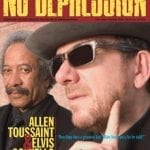Working Class Hero
From the train songs of Jimmie Rodgers to the coal mining laments of Merle Travis to the trucker anthems of Dave Dudley, country music has long championed the plight of the working class. The late Buzz Martin remains a unique and underappreciated heir to that tradition. Dubbed the Singing Logger, the Oregon native recorded a series of cult-favorite albums documenting the backbreaking labor and omnipresent danger facing workers in the northwest timber industry.
He was born Lloyd Earl Martin on September 14, 1928, in a tent pitched outside of Stayton, Oregon, a small valley town on the shores of the North Santiam River. Raised in grinding poverty, he suffered from cataracts as a child and was totally blind by age 13. While a student at the Oregon State School for the Blind, Martin underwent an experimental surgical process that restored his vision by replacing the lenses of his eyes with those of a deceased prison inmate. While in recovery, he began playing music, befriending a fellow patient with a guitar.
Martin exited the hospital an orphan and was sent to live with his older sister Nellie and her husband, Bill Woolsey. An amateur musician and luthier, Woolsey nurtured Martin’s interest in performing and years later crafted him a guitar in the shape of a double-bitted axe.
But it was Martin’s singing that spurred his writing. “Everyone else in the family was an instrumentalist — Dad was the only vocal musician, and that’s what eventually led him to start writing songs,” says son Steve Martin, who toured behind his father in the early 1970s.
Like myriad young men raised in the northwest during the Depression, Martin went to work as a logger. His simple, unadorned music captures in vivid detail the hazards and demands of the logging life. Songs such as “Fire Danger”, “Too High On The Stump” and “Unemployment Compensation” depict a world of maximum physical risk and minimum financial reward, intoned in a voice as rough and resilient as old hickory.
“There’s a lot of danger in the woods — they’ve made it safer, but there’s still a lot of things you can’t get away from,” says his son. “Dad’s best friend was killed by a widowmaker [a loose limb hanging high in a tree]. And you’re always fighting the elements — heat, cold, rain, mud. There’s only a few days a year when the weather is just right. The authorities shut you down when the humidity dips too low, because even the smallest spark can start a forest fire.”
Martin’s co-workers comprised his first audiences at the Shangri-La, a small tavern in Waldport, Oregon. His songs brought to life their day-to-day existence with bitter wit and a journalistic authenticity wrought from the strangely poetic timber lexicon that is the lingua franca of the logger fraternity. Peppered with references to “chokers” (steel cables with noose-like hook ends attached to logs), “whistle punk” (the operator of the steam whistle that serves as a means of communicating with workers) and “hoot owlin'” (working in the dead of night to avoid the sun’s blistering heat), Martin’s songs celebrate the working class without condescension or romanticism.
That said, “I don’t doubt that he had a dream of being a star and getting picked up by a big label,” Steve acknowledges. “This is just a guess, but even back then it was a competitive field and I bet he thought, ‘Hey, there’s thousands of loggers around, and I know what this life is all about. I can write well about this, and it’s an area no one else has targeted.’ But most of all, he genuinely liked loggers as people.”
In 1964, after years of playing dances and bars up and down the Oregon coast, Martin reached out to Buddy Simmons, a popular Portland radio personality and host of “Channel 2 Hoedown”, the local ABC-TV affiliate’s country music showcase. Martin soon made his broadcasting debut on the program, so impressing Simmons that he helped Martin land a record deal with the Eugene-based independent label Lavender. Martin’s debut single “Whistle Punk Pete” followed in 1967 and proved enough of a regional hit for Martin to quit logging and pursue music full-time. He moved the family to Portland in 1968 and signed to Vancouver, Washington, imprint Ripcord Records, which issued his first full-length effort Where There Walks A Logger There Walks A Man.
Martin released six LPs in all. On his third and finest album, A Logger Finds An Opening, he significantly expanded his thematic outlook, decrying technological progress with the prescient “Automatic Love” and painting a wry portrait of domestic travails with “Butterin’ Up Biscuit”. Ripcord’s distribution was spotty at best, but Martin nevertheless toured everywhere from Canada to Nashville, selling his records by hand. Often he toured with his children and their spouses, a backing group dubbed the Chips Off the Old Block.
The zenith of Martin’s career was his 1971 appearance on the “The Johnny Cash Show”. Steve says his father met Cash backstage after a performance at the Portland Coliseum; their friendship served as the inspiration behind Martin’s single “The Man At The Top”.
By the end of the 1970s, Martin’s music career was in decline, and he was forced to resume logging. In 1980 he relocated to Alaska, but he returned to the Portland area long enough to record a still-unreleased gospel record.
On August 1, 1983, Martin set out for a hunting trip and never returned. “They think he was crossing a tide pool when he slipped and fell. He went unconscious and drowned,” says Steve, whose 7-year-old son was part of the rescue crew that found Martin’s body.
Today, Steve Martin is in the process of acquiring his father’s masters and copyrights with an eye toward issuing a box set. He also performs Buzz’s music at logger events, and released the solo album Where There Walks A Logger: A Tribute To My Dad Buzz Martin.




